(完整)小升初情态动词
- 格式:docx
- 大小:16.50 KB
- 文档页数:9
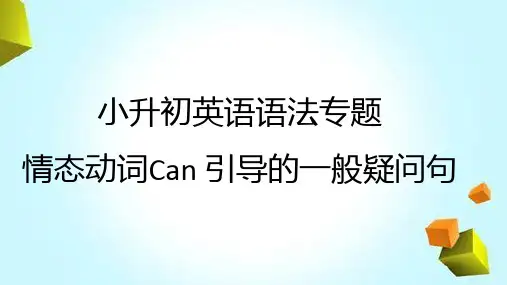
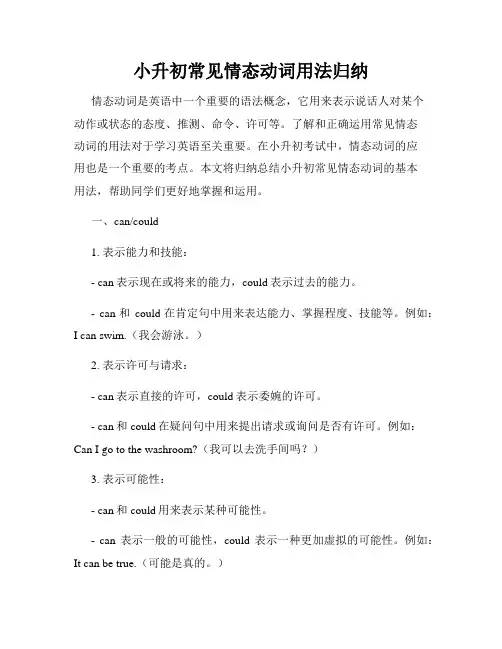
小升初常见情态动词用法归纳情态动词是英语中一个重要的语法概念,它用来表示说话人对某个动作或状态的态度、推测、命令、许可等。
了解和正确运用常见情态动词的用法对于学习英语至关重要。
在小升初考试中,情态动词的应用也是一个重要的考点。
本文将归纳总结小升初常见情态动词的基本用法,帮助同学们更好地掌握和运用。
一、can/could1. 表示能力和技能:- can表示现在或将来的能力,could表示过去的能力。
- can和could在肯定句中用来表达能力、掌握程度、技能等。
例如:I can swim.(我会游泳。
)2. 表示许可与请求:- can表示直接的许可,could表示委婉的许可。
- can和could在疑问句中用来提出请求或询问是否有许可。
例如:Can I go to the washroom?(我可以去洗手间吗?)3. 表示可能性:- can和could用来表示某种可能性。
- can表示一般的可能性,could表示一种更加虚拟的可能性。
例如:It can be true.(可能是真的。
)二、may/might1. 表示推测和猜测:- may和might用来表示对某种情况的推测和猜测。
- may表示一种更有把握的可能性,might表示一种更加不确定的可能性。
例如:He may be late.(他可能会晚到。
)2. 表示许可与请求:- may表示正式的许可,might表示委婉的许可。
- may和might在疑问句中用来提出请求或询问是否有许可。
例如:May I use your pen?(我可以用你的笔吗?)三、must1. 表示推测和肯定:- must用来表示对某种情况的推测和肯定。
- must表示说话人的判断或逻辑上的必然。
- must在疑问句中表示对应对方的情况感到惊异或不解。
例如:You must be tired.(你一定很累。
)2. 表示义务和必须:- must表示说话人的认定,有一种应当的意味。
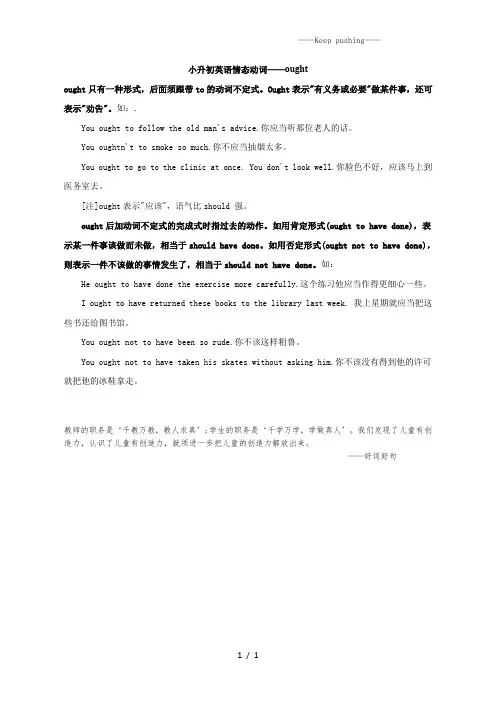
——Keep pushing——小升初英语情态动词——oughtought只有一种形式,后面须跟带to的动词不定式。
Ought表示"有义务或必要"做某件事,还可表示"劝告"。
如:.You ought to follow the old man's advice.你应当听那位老人的话。
You oughtn't to smoke so much.你不应当抽烟太多。
You ought to go to the clinic at once. You don't look well.你脸色不好,应该马上到医务室去。
[注]ought表示"应该",语气比should 强。
ought后加动词不定式的完成式时指过去的动作。
如用肯定形式(ought to have done),表示某一件事该做而未做,相当于should have done。
如用否定形式(ought not to have done),则表示一件不该做的事情发生了,相当于should not have done。
如:He ought to have done the exercise more carefully.这个练习他应当作得更细心一些。
I ought to have returned these books to the library last week. 我上星期就应当把这些书还给图书馆。
You ought not to have been so rude.你不该这样粗鲁。
You ought not to have taken his skates without asking him.你不该没有得到他的许可就把他的冰鞋拿走。
教师的职务是‘千教万教,教人求真’;学生的职务是‘千学万学,学做真人’。
我们发现了儿童有创造力,认识了儿童有创造力,就须进一步把儿童的创造力解放出来。
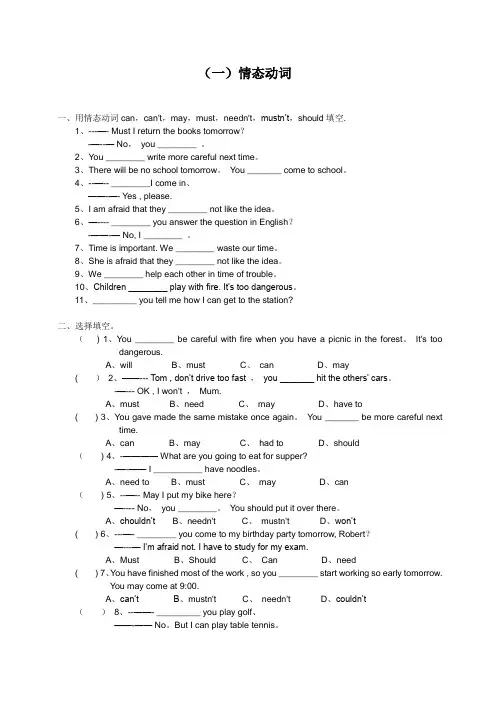
(一)情态动词一、用情态动词can,can't,may,must,needn't,mustn’t,should填空.1、---—- Must I return the books tomorrow?-—--— No,you ________ 。
2、You ________ write more careful next time。
3、There will be no school tomorrow。
You _______ come to school。
4、--—-- ________I come in、——-—- Yes , please.5、I am afraid that they ________ not like the idea。
6、—---- ________ you answer the question in English?-——-— No, I ________ 。
7、Time is important. We ________ waste our time。
8、She is afraid that they ________ not like the idea。
9、We ________ help each other in time of trouble。
10、Children ________ play with fire. It’s too dangerous。
11、_________ you tell me how I can get to the station?二、选择填空。
() 1、You ________ be careful with fire when you have a picnic in the forest。
It's too dangerous.A、willB、mustC、canD、may( )2、——--- Tom , don’t drive too fast ,you _______ hit the others’ cars。
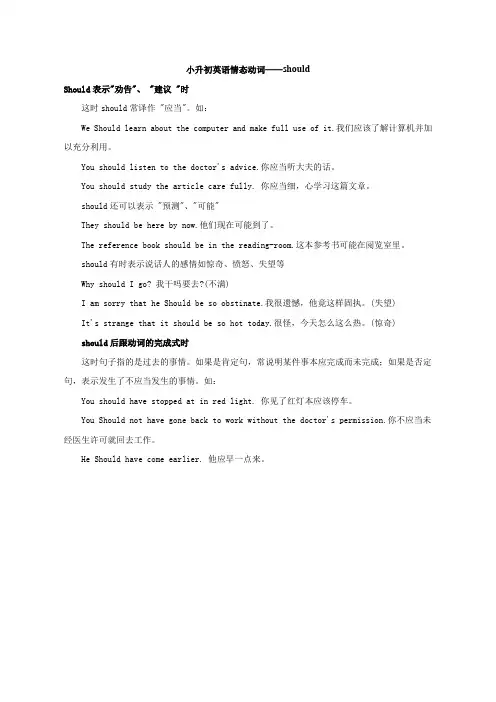
小升初英语情态动词——shouldShould表示"劝告"、 "建议 "时这时should常译作 "应当"。
如:We Should learn about the computer and make full use of it.我们应该了解计算机并加以充分利用。
You should listen to the doctor's advice.你应当听大夫的话。
You should study the article care fully. 你应当细,心学习这篇文章。
should还可以表示 "预测"、"可能"They should be here by now.他们现在可能到了。
The reference book should be in the reading-room.这本参考书可能在阅览室里。
should有时表示说话人的感情如惊奇、愤怒、失望等Why should I go? 我干吗要去?(不满)I am sorry that he Should be so obstinate.我很遗憾,他竟这样固执。
(失望)It's strange that it should be so hot today.很怪,今天怎么这么热。
(惊奇)should后跟动词的完成式时这时句子指的是过去的事情。
如果是肯定句,常说明某件事本应完成而未完成;如果是否定句,表示发生了不应当发生的事情。
如:You should have stopped at in red light. 你见了红灯本应该停车。
You Should not have gone back to work without the doctor's permission.你不应当未经医生许可就回去工作。
He Should have come earlier. 他应早一点来。
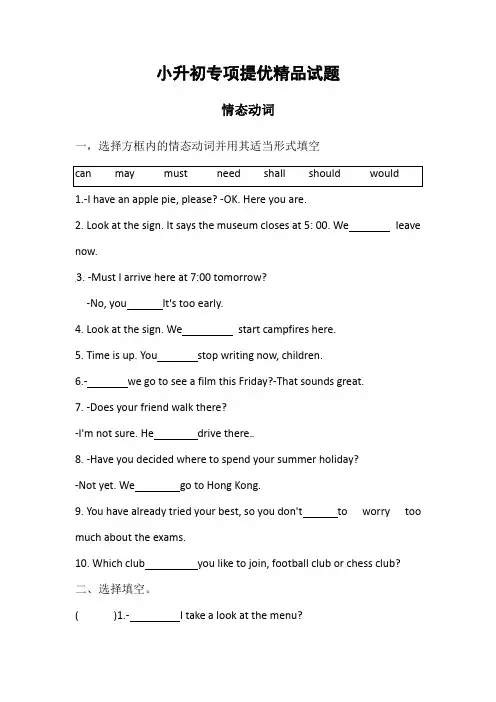
小升初专项提优精品试题情态动词一,选择方框内的情态动词并用其适当形式填空1.-I have an apple pie, please? -OK. Here you are.2. Look at the sign. It says the museum closes at 5: 00. We leave now.3. -Must I arrive here at 7:00 tomorrow?-No, you It's too early.4. Look at the sign. We start campfires here.5. Time is up. You stop writing now, children.6.- we go to see a film this Friday?-That sounds great.7. -Does your friend walk there?-I'm not sure. He drive there.8. -Have you decided where to spend your summer holiday?-Not yet. We go to Hong Kong.9. You have already tried your best, so you don't to worry too much about the exams.10. Which club you like to join, football club or chess club?二、选择填空。
( )1.- I take a look at the menu?-Sure. Here you are.A. MayB. ShouldC. Shall( )2. You always finish your work on time, Jason.A. CanB. ShouldC. need( )3. This book _____Tom's. I can see Anna's name on it.A. might beB. may beC. can't be( )4.- I borrow your crayons?-OK. Here you are.A. MustB. MayC. Need( )5. - Bob, shall we go to see a film today?-Sorry, I'm afraid I can't. You ask Peter.A. NeedB. mayC. must( )6. -Have you decided what to do tomorrow?-Not yet. We go fishing tomorrow.A. MayB. shouldC. must( )7. -What birds do? -They can't swim.A. CanB. can'tC. must( )8. Boys and girls, you not play with fire. It is dangerous.A. MustB. mayC. can( )9. You brush your teeth twice every day.A. NeedB. shouldC. may( )10. - Dad, can I go to the party tonight?-Sure, but you come back home before 9 o'clock.A. CanB. mustC. may三、按要求改写句子,每格限一词。
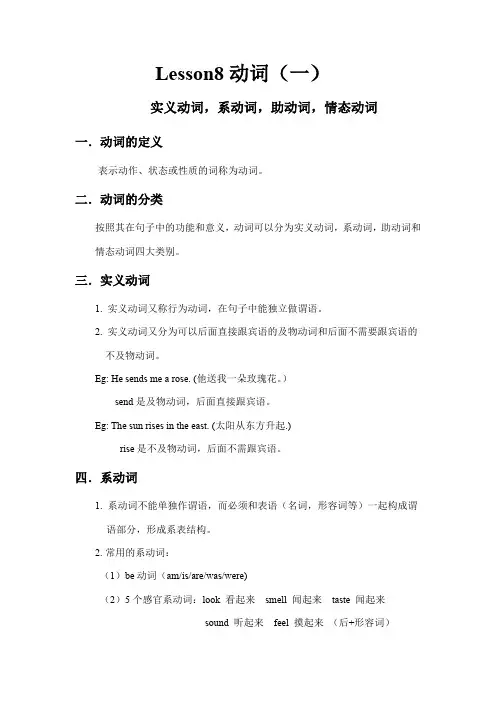
Lesson8动词(一)实义动词,系动词,助动词,情态动词一.动词的定义表示动作、状态或性质的词称为动词。
二.动词的分类按照其在句子中的功能和意义,动词可以分为实义动词,系动词,助动词和情态动词四大类别。
三.实义动词1. 实义动词又称行为动词,在句子中能独立做谓语。
2. 实义动词又分为可以后面直接跟宾语的及物动词和后面不需要跟宾语的不及物动词。
Eg: He sends me a rose. (他送我一朵玫瑰花。
)send是及物动词,后面直接跟宾语。
Eg: The sun rises in the east. (太阳从东方升起.)rise是不及物动词,后面不需跟宾语。
四.系动词1. 系动词不能单独作谓语,而必须和表语(名词,形容词等)一起构成谓语部分,形成系表结构。
2.常用的系动词:(1)be动词(am/is/are/was/were)(2)5个感官系动词:look 看起来smell 闻起来taste 闻起来sound 听起来feel 摸起来(后+形容词)Eg: She looks beautiful today. 她今天看起来很漂亮。
The flowers smell sweet. 这些花闻起来很香。
That sounds good. 那听起来不错。
(3)get/become/turn/go 表变化,后加形容词。
Eg: It gets warmer and warmer. 天气变得越来越暖和。
In fall, the leaves turn yellow. 秋天树叶变黄。
The food goes bad easily in summer. 食物在夏天很容易变坏。
五.助动词1. 助动词本身没有词义,不能单独做谓语,只能和主要动词一起构成谓语动词,表示否定、疑问、时态、语态等语法形式,或用来加强语气。
常用的助动词有:be, do, have, shall, will。
2. 助动词be(1)可用于构成时态,主要是进行时:I am looking at you.(2)可用于构成被动语态: You are being looked.(3)可与动词不定式构成谓语: My job is to look at you every minute.3. 助动词have(1) 构成完成时态:We have learned English for many years.(2)和动词不定式构成谓语,表示因客观环境促使不得不做的事情:We have to learn English very well.4. 助动词do(1) 构成疑问句和否定句:Dose he do his homework after school?(2)用来加强语气:I do want to buy a new car.(3)用来代替动词词组:Write a letter “L” as I do.5.助动词shall构成将来时态,单纯表示未来情况:Shall I begin?6.助动词will构成将来时,用于第一,二,三人称。
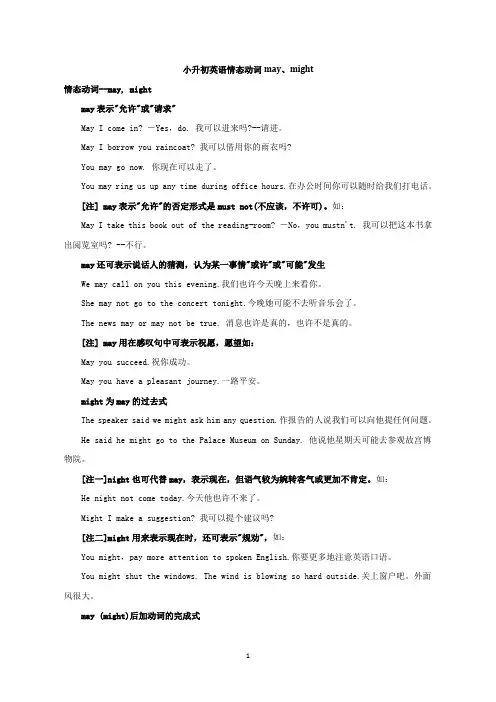
小升初英语情态动词may、might情态动词--may, mightmay表示"允许"或"请求"May I come in? -Yes,do. 我可以进来吗?--请进。
May I borrow you raincoat? 我可以借用你的雨衣吗?You may go now. 你现在可以走了。
You may ring us up any time during office hours.在办公时间你可以随时给我们打电话。
[注] may表示"允许"的否定形式是must not(不应该,不许可)。
如:May I take this book out of the reading-room? -No,you mustn't. 我可以把这本书拿出阅览室吗? --不行。
may还可表示说话人的猜测,认为某一事情"或许"或"可能"发生We may call on you this evening.我们也许今天晚上来看你。
She may not go to the concert tonight.今晚她可能不去听音乐会了。
The news may or may not be true. 消息也许是真的,也许不是真的。
[注] may用在感叹句中可表示祝愿,愿望如:May you succeed.祝你成功。
May you have a pleasant journey.一路平安。
might为may的过去式The speaker said we might ask him any question.作报告的人说我们可以向他提任何问题。
He said he might go to the Palace Museum on Sunday. 他说他星期天可能去参观故宫博物院。
[注一]night也可代替may,表示现在,但语气较为婉转客气或更加不肯定。
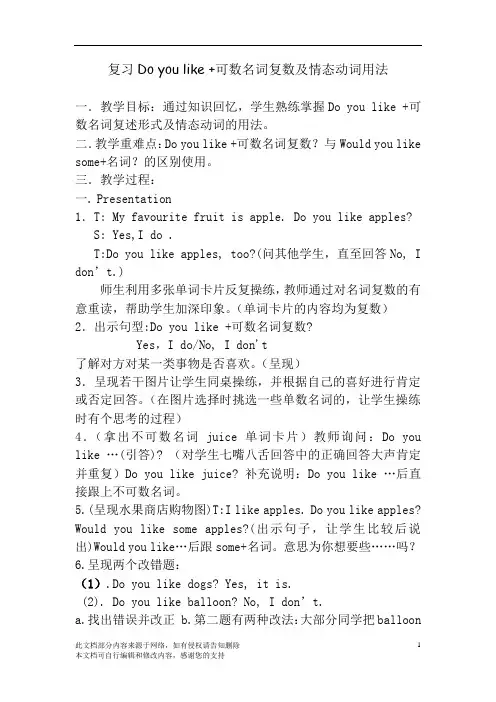
复习Do you like +可数名词复数及情态动词用法一.教学目标:通过知识回忆,学生熟练掌握Do you like +可数名词复述形式及情态动词的用法。
二.教学重难点:Do you like +可数名词复数?与Would you like some+名词?的区别使用。
三.教学过程:一.Presentation1.T: My favourite fruit is apple. Do you like apples?S: Yes,I do .T:Do you like apples, too?(问其他学生,直至回答No, I don’t.)师生利用多张单词卡片反复操练,教师通过对名词复数的有意重读,帮助学生加深印象。
(单词卡片的内容均为复数)2.出示句型:Do you like +可数名词复数?Yes,I do/No, I don't了解对方对某一类事物是否喜欢。
(呈现)3.呈现若干图片让学生同桌操练,并根据自己的喜好进行肯定或否定回答。
(在图片选择时挑选一些单数名词的,让学生操练时有个思考的过程)4.(拿出不可数名词juice单词卡片)教师询问:Do you like …(引答)? (对学生七嘴八舌回答中的正确回答大声肯定并重复)Do you like juice? 补充说明:Do you like …后直接跟上不可数名词。
5.(呈现水果商店购物图)T:I like apples. Do you like apples? Would you like some apples?(出示句子,让学生比较后说出)Would you like…后跟some+名词。
意思为你想要些……吗?6.呈现两个改错题:(1).Do you like dogs? Yes, it is.(2). Do you like balloon? No, I don’t.a.找出错误并改正b.第二题有两种改法:大部分同学把balloon改成balloons,第二种改法在balloon前加上限定词the或this,that等。
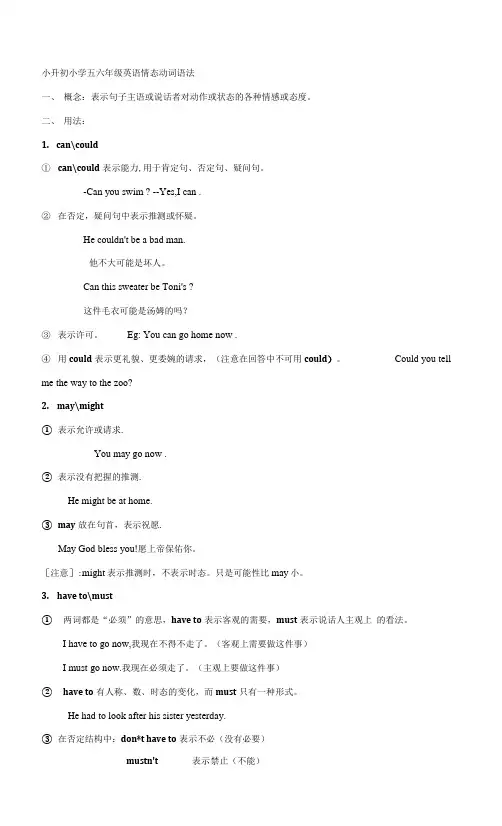
小升初小学五六年级英语情态动词语法一、概念:表示句子主语或说话者对动作或状态的各种情感或态度。
二、用法:1.can\could①can\could表示能力,用于肯定句、否定句、疑问句。
-Can you swim ? --Yes,I can .②在否定,疑问句中表示推测或怀疑。
He couldn't be a bad man.他不大可能是坏人。
Can this sweater be Toni's ?这件毛衣可能是汤姆的吗?③表示许可。
Eg: You can go home now .④用could表示更礼貌、更委婉的请求,(注意在回答中不可用could)。
Could you tell me the way to the zoo?2.may\might①表示允许或请求.You may go now .②表示没有把握的推测.He might be at home.③may放在句首,表示祝愿.May God bless you!愿上帝保佑你。
[注意]:might表示推测时,不表示时态。
只是可能性比may小。
3.have to\must①两词都是“必须”的意思,have to表示客观的需要,must表示说话人主观上的看法。
I have to go now,我现在不得不走了。
(客观上需要做这件事)I must go now.我现在必须走了。
(主观上要做这件事)②have to有人称、数、时态的变化,而must只有一种形式。
He had to look after his sister yesterday.③在否定结构中:don*t have to表示不必(没有必要)mustn't 表示禁止(不能)You don't have to tell him about it.你不一定要把此事告诉他。
You mustn't tell him about it. 你一定不要把这件事告诉他。
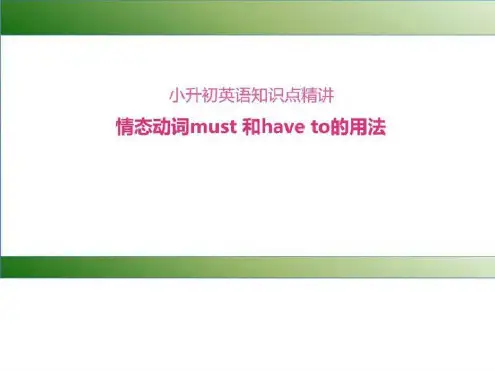
小升初情态动词专项一、情态动词的意义和用法情态动词是一种表示说话人的主观感情或态度的动词,在英语中起着非常重要的作用。
常见的情态动词有can、may、must、will、shall 等。
二、小升初情态动词的考点在小升初英语考试中,情态动词的考点主要集中在以下几个方面:1、can和could的用法:can用于表示现在的能力,could用于表示过去或将来的能力。
例如:I can swim,but he can't swim.(我会游泳,但他不会游泳。
)She could sing when she was only three.(她只有三岁的时候就会唱歌。
)2、may和might的用法:may表示“可以”、“可能”,might表示“也许”,语气较为不确定。
例如:You may go now.(你现在可以走了。
)It might rain later.(天可能会下雨。
)3、must和have to的用法:must表示“必须”,have to表示“不得不”。
例如:You must finish your homework.(你必须完成你的作业。
)I have to go to school today.(我今天必须去上学。
)4、will和shall的用法:will表示将来的一般意向,shall用于第一人称的问句中,用来征求对方的意见。
例如:What will you do tomorrow?(明天你会做什么?)Shall we go to the park?(我们可以去公园吗?)5、should和would的用法:should表示“应该”,would表示过去的某个时间点的意向或过去的习惯。
例如:You should eat more vegetables.(你应该多吃蔬菜。
)He would often go fishing on weekends.(他经常在周末去钓鱼。
)A.既;又B.不仅;而且C.因为;所以D.虽然;但是其实——其实他并不想去看电影。
小升初英语情态动词情态动词是英语中的一类特殊动词,它们在句子中用来表示说话人的态度、推测、建议、请求等。
掌握情态动词的用法对于小升初学生来说是非常重要的。
本文将介绍几个常用的情态动词及其用法,以帮助小升初学生更好地理解和运用情态动词。
1. Can(能)Can是一个常用的情态动词,表示某人具有某种能力或许可。
它的否定形式是cannot或can't。
Can通常用来表示能力、允许以及请求对方做某事。
能力:- I can swim.(我会游泳。
)- She can play the piano.(她会弹钢琴。
)许可:- Can I go to the restroom?(我可以去洗手间吗?)- Can I have a piece of cake?(我可以吃一块蛋糕吗?)请求:- Can you help me with my homework?(你能帮我做作业吗?)- Can you please pass me the salt?(你能把盐递给我吗?)2. May(可能)May用于表示可能性,也可用于表示请求的礼貌方式。
它的否定形式是may not。
可能性:- It may rain tomorrow.(明天可能会下雨。
)- He may be late for the meeting.(他可能会迟到会议。
)请求:- May I use your phone?(我可以使用你的手机吗?)- May I borrow your pen?(我可以借用你的笔吗?)3. Must(必须)Must表示某事具有强制性,必须做某事。
它的否定形式是must not 或mustn't。
强制性:- You must finish your homework before playing games.(你必须先完成作业再玩游戏。
)- We must be on time for the concert.(我们必须准时参加音乐会。
学科辅导讲义I will have to finish the work tomorrow.我明天必须完成这项工作。
(3)否定形式don't/doesn't have to表示“不必”,而mustn't则表示“不应该;禁止”。
e. g. You don't have to wait for me.你不必等我。
We mustn't cut in line.我们不应该插队。
7.情态动词should①表示义务,意为“应该;应当;最好”,比must委婉e. g. You should apologize to him.你应该向他道歉。
You should not eat so greedily.你不应该如此贪吃。
My teacher said (that)I should study harder.老师说我应该更加用功地读书。
②与疑问词连用,表示意外、纳闷、惊讶等,意为“究竟是……;到底是……”e. g. Why should you think that way? 你到底为什么会那么想呢?How should I know? 我怎么会知道?8.情态动词:need1. need是一个特殊的情态动词,意为“需要”。
它不仅能作为情态动词使用,还能充当一个实义动词。
如:Need I do my homework now?我必须现在做家庭作业吗?What do you need?你需要什么?2. need用作行为动词时,用法与其它行为动词相同。
如:You don't need to finish it right now.你不用现在就完成它。
We need to have a break.我们需要休息。
Do they need to know this?他们需要知道吗?3. need作为情态动词时,其过去式为need。
但need作为实义动词时,其过去式为needed.如:I'm sorry I need answer a phone call.So I couldn't talk with you yesterday.抱歉我昨天要听电话,没能跟你好好谈谈。
小升初英语情态动词—can、could情态动词--can, couldcan的词义表示体力或脑力方面的"能力"或客观上的"可能"。
如:Can you ride a bike? Yes,I can.你能骑自行车吗?是的,我能骑。
Can Mr. Smith use chopsticks? No,he can't . 史密斯先生会用筷子吗?不,他不会。
Most women here can read and write now.这里的多数妇女都能识字,也会写字。
In China even barren mountains can be turned into fertile fields. 在中国,荒山也能变成良田。
can用在否定句和疑问句中时在这种句子中,can常可意谓"可能",表示猜测和推理。
如:It surely can't be six o'clock already? 不可能已经六点钟了吧?You can't be hungry so soon,Tom. You've just had lunch. 顿姆,你不可能饿得这么快,你刚吃过午饭。
She cannot be so careless. 她不可能这么粗心。
Where can he be? 他会在什么地方呢?What can he mean? 他会是什么意思呢?It surely can't be six o'clock already? 不可能已经是六点钟了吧?[注一] can加动词的进行时态,也可表示"可能"。
如:What can he be doing all this time? 他一直会是在干什么呢?She cannot be playing ping-pong now.她现在不可能在打乒乓球。
小升初(完整版)情态动词专题(练习题含答案)一、选择题1.The boy is very brave.I ________ he ________ the tall tree.A.dare say; dares to climbB.dare to say; dare climbingC.dare saying; dares climbD.dare to say; dares climbed2.To my joy, we_________ go to the bank. Mary has lent us some money.A.shouldn’t B.needn’t C.couldn’t D.wouldn’t3.—I must go to school today, ________?—No, you ________.You can go as soon as you get well.A.mustn’t I;needn’t B.needn’t I;needn’tC.mustn’t I;mustn’t D.needn’t I;mustn’t4.—How do you like my new dress?—Well, if I ________ say, it is not suitable for you.A.may B.must C.have to D.should 5.—Hurry up, Jack! Let’s cross the road as fast as possible.—No, you ________. Don’t you see the light is still red?A.couldn’t B.wouldn’t C.mustn’t D.needn’t6.—________ you give me a hand? I can’t put up the poster by myself.—No problem.A.Could B.Should C.Need D.Must 7.—Where is Tom? I am considering ________ him about the result of the exam.—Oh. You ________. He has known it already.A.to tell; can't B.telling; needn't C.tell; mustn't D.told; shouldn't 8.When you visit a museum, some instructions should ________ and we’d better not ________ them.A.pay attention to; be against B.be paid attention; againstC.be paid attention to; against D.be paid attention to; be against 9.—Could I join you in the programme?—Sorry, you ________. You are too young.A.shouldn’t B.mustn’t C.can’t D.needn’t 10.Please don't make so much noise. I ________ hear the speaker very well.A.needn't B.can't C.shouldn't D.mustn't11.—Is it really necessary for me to go shopping with a mask on?—I’m afraid you ________ in public. It is not only to protect yourself but also to protect others. A.must B.should C.can D.need12.—The high school entrance examination is coming!—Yes, our teacher tells us we _______ be too careful while taking exams.A.mustn't B.shouldn't C.needn't D.can't13.—Amy, I hear you've got many foreign coins._______ I have a look?—Of course, I'll fetch them for you.A.May B.MustC.Should D.Need14.When I was young, my father ___________ take me to climb the hill which was not far from our house.A.may B.must C.would D.should15.You ______ pay too much attention to your pronunciation, as it is so important in the oral (口头的) test.A.shouldn’t B.mustn’t C.can’t D.needn’t 16.—Shall we go camping this summer holiday?—Nothing________be better.A.should B.could C.must D.may 17.—Ready? Let’s get started, Martin.— Swimming? I just ________ get used to it in winter.A.can’t B.needn’t C.mustn’t D.shouldn’t 18.—Will your mother be at home this Saturday?—Hard to say. She _______go to the countryside to see my grandparents.A.must B.may C.can D.would 19.Don’t cross the road until the traffic lights turn green. A car_______hit you.A.need B.may C.should D.must20.— Zoe, what do you think is the greatest advantage of shopping online?— At least I ______ spend much time going from shop to shop.A.shouldn’t B.can’t C.needn’t D.mustn’t21.— The sandstorm in Beijing is so serious this year.— Yes, I wonder when we ________ worry about the air we breathe.A.can’t B.mustn’t C.needn’t D.shouldn’t 22.You _________ smoke here! Look at the sign. It says "No smoking".A.needn't B.mustn't C.can D.may23.We've discussed every detail of this plan and have got everything ready. But still something ________ go wrong. We still have to be very careful.A.must B.should C.would D.may24.—Suzy described every detail of the accident just now.—Her memory ________ be completely back.A.shall B.need C.must D.could25.Most young people like shopping online because they ________ spend much time going from shop to shop.A.needn’t B.can’t C.mustn’t D.shouldn’t 26.— Is the boy over there Tom? He often wears a jacket like that.— It _______ be him. He is absent from school today.A.needn’t B.shouldn’t C.mustn’t D.ca n’t27.You ________ pay too much attention to protecting yourself if you plan to go abroad. A.mustn’t B.can’t C.shouldn’t D.needn’t 28.—Shall I tell him the change of the time right now?—I’m afraid you ________, otherwise he will be late for the meeting.A.can B.may C.must D.need29.Hurry up, or we ________ miss the beginning of the film.A.should B.must C.may D.have to30.Cars ________ give way to walkers on some roads in Binhai, or the drivers will be fined. A.may B.will C.can D.must31.— What is that yo ung lady’s job?—She ________ be a nurse, I’m not sure.A.must B.may C.need D.would 32.—Could you tell me how to renew the library books?—With pleasure. You ________ come to our desk every time. It’s easier to renew them online. A.can’t B.mustn’t C.needn’t D.shouldn’t33.For the safety of the passengers, objects like guns ________ be carried on board.A.may not B.needn’t C.might not D.mustn’t34.— What do you think of the show yesterday?— Some of them were really good but others ________ be better.A.will B.must C.need D.can35.—I don’t care what people think.—Well, you _______ . Some opinions are worth weighing.A.should B.might C.could D.would36.—I think they are enough. We ________ make so many chairs.—I don’t think so. Because nearly a quarter of t hem need ________.A.don’t need to; mending B.needed; to be mendedC.don’t need; mend D.need; to mend37.It’s of great importance to protect the environment. Each of us ________ take an active part in it.A.can B.may C.would D.should38.—Do we have to finish this today?—Yes, you ________ . Today is the last day.A.would B.may C.can D.must39.Sorry, smoking is not allowed here. If you ________ , you will be fined according to the rules. A.can B.will C.may D.must 40.—Seventy dollars for such a dress! You ________ be joking!—I’m serious. It’s made of silk from Hangzhou.A.must B.need C.will D.can【参考答案】一、选择题1.A解析:A【解析】句意“这个小男孩非常的勇敢,我敢说,他敢爬上那棵高的树”。
小学英语小升初专题训练-词法专项练习:情态动词一、单选题(共34题;共68分)1."You ________ kill Snow White," said the queen.A. mustB. couldC. can2.We should ________ too many trees.A. stop cutting downB. stop cut downC. stopping cut down3.You shouldn't the trash in the woods after the picnic.A. leaveB. leftC. want4._________ you please give me a glass of juice?A. CanB. CouldC. May5.Shanghai is _________ a big city in China.A. mustB. reallyC. can6._________ I have some juice?A. WouldB. CanC. May7.Hello, _________ I speak to my mother?A. mayB. whyC. how8.We be quiet in the classroom.A. shouldB. shouldn'tC. can't9.When you feel angry, you should __________________ a deep breath and count to ten.A. doB. takesC. take10.What can you ______?A. doB. doesC. doing11.Hurry up! I can't _________ the balloons.A. holdB. heldC. holding12.The kite can ________ high in the sky.A. flyB. flyingC. flies13.Mike couldn't swimming before.A. goB. goesC. went14.Could you _______ stars at night?A. seeB. sawC. sea15.Can you _______ the dog's barking?A. listenB. listeningC. hear16.We should _______________ hard and _______________ healthy.A. studies; staysB. studying; stayingC. study; stay17.__________wood, we _________cut down too many trees.A. Save; shouldn'tB. To save; shouldn'tC. To save; should18._________ you please give me a pencil?A. CanB. CouldC. May19.Can you my pen friend?A. beB. to beC. being20.We should not on the grass.A. walkingB. to walkC. walk21.—_________ you like some juice?—No, thanks.A. CanB. WouldC. Could22.Trees are good for us. We _________ take good care of them.A. couldB. mayC. should23.— _________ I hand in my homework this afternoon?—No, you _________. You can hand it in tomorrow,A. Must, mustn'tB. May, can'tC. Must, needn't24.Louis ________ run, but he ________ swim in the river. He is only 5.A. can; can'tB. can't; can'tC. can; can25.He was three then. He______________ talk. He______________ swim.A. can; canB. can't; couldn'tC. could; couldn't26.You______________ be late. You______________ work hard.A. should: shouldB. should; shouldn'tC. shouldn't; should27.You______________ take the books down.A. shouldB. shouldn'tC. could angry now!28.The girl______________ walk then.A. canB. couldn'tC. can t29.Can you see the red man? You ______ cross the road now.A. mustn'tB. mustC. can30.—Who will be responsible for classroom cleaning, Jim or Nancy?—It be Jim because he is on holiday.A. needn'tB. shouldn'tC. mustn'tD. can't31.There was nothing he________ do.A. canB. couldC. coulds32.Suddenly Mocky couldn't________.A. breatheB. breathedC. breathes33.— What can she _____?— She can play ping-pong.A. doesB. doC. doesn'tD. don't34.— Can I wear my new skirt today?— Yes, you _______.A. canB. can'tC. doD. don't二、选词填空(词汇运用)(共2题;共2分)35.________ (Can/Could) I help you?36.You ________(should /shouldn't) clean your room.三、语法填空(共14题;共24分)37.Helen Keller ________ (could) hear.38.We should ________ (keep) ________ (we) city clean.39.We ________ (should) stop ________ (use) plastic bags.40.You can ________ (see) a lot of tall ________ (building).41.Please stop ________ (make) noise. I can't ________ (hear) the teacher.42.All of us should ________ (do) something ________ (save) wild animals.43.You should ________ (be) quiet in the library.44.The driver must ________ (look) at the traffic lights.45.We must ________ (listen) to our teachers in class.46.We ________ (must) play near fires.47.We ________ (must) keep our classroom clean.48.I couldn't speak English then. But I ________ (can) speak English now.49.We should ________ (take) exercise every day.50.用情态动词can,must,should,shall填空(1)At Halloween you________ give candy to the children if they come to knock at your door. (2)What________Danny do if he wants to become thin and healthy?(3)When________we go to see the film "Rabbit Run"?(4)In the Science Museum you________see robots playing the piano well.(5)We________know a lot of English words if we want learn English well.(6)________ we go to the park and fly our kites there?答案解析部分一、单选题1.【答案】A【考点】动词辨析,情态动词【解析】【分析】句意:“你……杀死白雪公主。
小升初英语专项练习:情态动词-、情态动词的定义:情态动词有词义,但它不能单独作谓语,它必须和其他动词一起构成 谓语。
情态动词没有人称和数的变化;它的后面必须跟动词原形。
二、情态动词的种类:情态动词有 can (could), may, must, have to, shall (should), will (would), n eed 等,这些是小学阶段需掌握的情态动词。
三、情态动词的用法:1)表示能力(体力、知识、技能)box (体力)能) 2)表示请求和允许。
Can I go nowCould \Ca n you help me ——Yes, of course.'Certai nly.\ Sure. Could \Can you tell me the way to the Zoo 3)表示推测(惊讶、怀疑、不相信的态度),用于疑问句、否定句和Can you lift this heavy Mary can speak three Ian guages.(知识) Can you skate (技感叹句中Can this be true This can' t be done by him. How can this be true1)表示请求和允许。
否定回答时可用can' t或mustn' t ,表示“不可以,禁止”。
——May I smoke in this room ——No, you mustn ' t. —— May I take this book out of the room ——Yes, you can. (No, you can ' t / mustn ' t)用May I...征徇对方许可时比较正式和客气,而用Can I… 在口语中更常见。
2 )表示推测、可能性(不用于疑问句)。
1. He maybe very busy now. 2 . Your mother maynot know the truth.3)用于祈使句,表示祝愿。
May you succeed!My sister is ill; my mother has to look after her. I had to work whe n I was your age.注意:must的否定形式must n't表示禁止,意思是“不能,不许”。
在回答由must引起的疑问句时,如果是否定的,不能用must n't (禁止,不准),而用needn‘ t, don ' t have to (不必要)。
—— Must we hand in our exercise books today ---- Yes, you must.No, you don' t have to / you needn ' t.2) must表示推测、可能性(只用于肯定的陈述句),意思为“一定是,必然........... ”。
1. You' re Tom s good friend, so you must know what he likes best.2. Your mother must be wait ing for you now.1) shall用于第一人称,征求对方的意见What shall we dothis eve ning 2) shall用于第二、三人称,表示说话人给对方的命令、警告、允诺或威胁。
1. You shall fail if you don ' t work hard.(警告)2. He shall have the book whe n I fin ish it.(允诺)3. He shall be pun ished.(威胁)五、should和shouldn 't表示应该劝告、建议。
I should help her because she is in trouble.You should go to class right away. She shouldn' t play computer games too much.六、will (过去式would)1)做助动词,表示一般将来时,将要He will be home at six. Bob will leave school n ext month.2)作为情态动词时表示“愿意”“意愿” “会”I will help you. I will never do that again. Will / Would you pass me the ball, please(一)根据所学情态动词,填写适当形式1) ________ you like to go fishing with me2) ________ I go homenow No, you _________ stay You _________ take more exercise.4) The clock ______ tell us the time. 5) _______ you tellme how to get to the Qingyun Park6) My mother is ill. I _______ stay at home and look afterher.7) ______ you like some tea 8) Must I borrow the bookwith my ID cardNo, you _______ . 9) __________ I use your car Yes, you10) ______ we play football this afternoon( 二) 按要求改写句子。
1. I can swim fast. I __________ _______ fast. ( 否定句)2. You must return the books now. (一般疑问句) - _________ I the books now - No, you _______ .3. They could take the books out of the room.(否定句)They ________________ the books out of the room.4. He can play basketball well. (一般疑问句) ________________ he _____ basketball well5. You should get up early.(否定句) You _________ g et6. Could I borrow your pen (肯定否定回答)(三)对划线部分提问。
1. We mustn't pick the flowers in the park.2. We shouldpla nt more trees.3. I would you like some cakes to eat4. She could swim five years ago.5. Weshould protect animals because they are our good friends .could go to the ci nema (电影院)with his sister .(四)、圈出正确答案。
1)Lucy should _______ h er homework now. A. finishes B. finishing C. finished D. finish 2)My mother wouldback soon. A. came B. comes C. come D.will come 3 ) Could you me a hand. A. giving B. gives C. give n D. give4) Should I now. A. started B. starting C.start D. starts5) __ ake this one A. Could B. Will C. Are6) - Canyou speak En glish - No, I . A. must n't B. can'tC. could n'tD. maynot 7) You go and see a doctor because you had a fever( 发烧).A. couldB. mightC. shouldD. would8) Jim _ me tonight, but he isn't very sure yet. A. shouldB. mightC. wouldD. should 9) The children play footballon the road. A. could n't B. could C. must D. must n't 10) -Can I take this book out. - No, you . —A. must notB. could notC. will notD. aren't11) I like to go with you. A. could B. would C.should D. will12) She is bleeding ( 流血).She go to hospital quickly.A. couldB. wouldC. shouldD. will13) You watch TV after finishing your homework.A. wouldB. canC. mustD. should14 ) It is late. I go home now. A. could B. wouldC. shouldD. will15) - What I do at the meeting A. has to B. would likeC. shouldD. not should 16 ) you tell me where the WenHua Market is A. could B. must C. should D. have1 John__ come to see us toni ght, but he isn't very sure yet.A. mayB. needC. can' tD. must 2 John isn ' t in the classroom. He play soccer on the playgro und with Bob.A. canB. mustC. shouldD. can ' t3 That _______ not be her husba nd . She is still sin gle. A.may C. could D. might 4 You ______ go and see a doctor atonce because you got a fever.A. canB. mustC. dareD. would5 -Ca n you speak Japa nese -No, I __ . A. must n't B. can't C.n eed n't D. may not6 -He __ be in the classroom, I thi nk. -No, he ___ be in the classroom. I saw him go homea minute ago. can; maynot B. must; may not C. may; can't D. may; must n't7 -IsLena swimming in the pool -No, she ______________ swim. She is terrified of water.A. may notB. must notC. can't8 He isn't at school. I think heC. mustD. might mea n sad A. may B. must C. can D. should 10 The children __ p lay football on the road. can't B. canC. must n'tD. must D. n eed n't be ill. A. can B. shall9 - What do you think upset ” means-I ' m not sure. It。